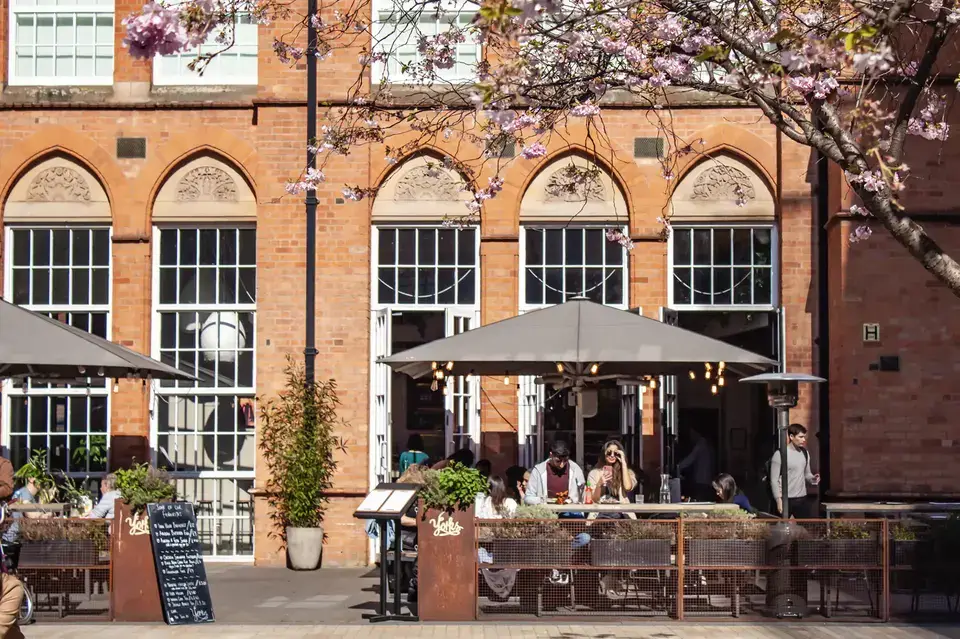When you think about student life, the routine you have feels like a never-ending loop: home, campus, library, repeat. You often spend your time running between lectures and seminars and revising in the library before you go back to your flat and cook dinner, doom scroll through social media, or binge a TV show.
Bouncing between two places, home and university, can feel extremely draining. It doesn’t give you the space you need to wind down and recharge, or enjoy your student life. Especially when your room also becomes a study space. This is why students need a third place.
What is a “Third Place”?
The idea of the third place theory comes from Ray Oldenburg, who described it as a social environment that is separate from home (which is your first place), and work (your second place). These are the places where people spend time casually, connect with others, and unwind at the end of the day.
For a student, a third place could be anywhere. It could be that nice, artsy coffee shop in the town centre, that little wine bar next to the river. Anywhere. The important part of the third place isn’t the type of space it is, but how it makes you feel. Your third place should be somewhere you can relax, connect, and feel at home without actually being at home.
Why students should find their third place

Why does this third place effect matter so much for students? Besides having fun, having a third place can improve your university experience in several ways.
- Spending time in a comfortable and welcoming space can improve your mental health, reducing stress.
- You’re more likely to start a conversation outside of a formal setting, such as university, so your third place can encourage new friendships.
- It can boost productivity. Try not to do university work in your third place, you need to have a place where university stress isn’t also connected to. But try journal, or read, or doodle. Doing something creative here can help your brain have the reset it needs.
- Having a third place is also a great way of exploring the city you’ve moved to for university. You can discover some really niche little spots this way.
The first question a lot of students ask themselves is “where’s the best place to study?” but the third place allows you to ask “where can I live comfortably?” rather than just focusing on work.
Student-friendly third place ideas
If you want to know places you could count as a third place, good news: there’s not a one-size-fits-all tag attached to the idea. Student-friendly places include:
- Independent Cafes: try looking for smaller cafes with nice, comfy chairs. A laid-back vibe is a bonus!
- Bookshops/Record Shops: If you love books or music, try a bookshop or a record shop. You can quietly browse through their stock, talk to staff and ask for recommendations. I find these places to be so enjoyable. Big chain shops are usually easiest to find, but try looking for indie places too. Some larger chain bookstores, or some indie book/record stores often have events like live music, author talks, or open mic nights, which I’d recommend attending from time to time.
- Dessert shop: if you have a little cake shop, or ice cream place nearby (big chains like Kaspas, or Archies, or even better, an independent place), try one of these. They’re the perfect place to go after a lecture or a study session in the library.
- Art Galleries and Museums: these places are usually free or donation only. They’re great for walking through and taking things in, and they’re perfect for quiet and creative inspiration, especially when it’s exam season and essays are frying you.
- The local park, or a quieter, hidden green space: the fresh air will do you good, and it’s great for relaxing.
How to discover your third place

Finding a good third place that works for you might feel a little bit like dating. You might try a couple before you find one that suits you. You could ask locals or older students for ideas; they’ll know the hidden gems that not many people go to or that are open until later on in the evening.
A lot of students also tend to post and tag places on social media, so try looking at SnapMaps or the geotags on Instagram. You’ll be able to find ideas of quirky little places you could try out.
I’d recommend exploring places at more “off-peaks”, maybe between breakfast and lunch, or early afternoon. Finding a quiet place is always far better than a bustling place. When you’re walking around searching for your third place, try looking through the window to get an idea of how busy it gets.
Most importantly, make sure you feel comfortable and relaxed in your third place. It doesn’t need to be expensive, or fancy, or Instagram aesthetic. It just needs to feel like yours in a sense.
Why this matters for your uni experience
University life is full of highs and lows, deadlines, part-time jobs, and the stress of a social life. Routine can feel constricting. Finding your third place is a way to break out of that loop, build memories, and make your student city feel like home.
Think of it this way: in five years, when you look back on uni, what will you remember more: the late nights in the library, or that quirky café where you and your friends spent hours laughing over waffles?
Being a student isn’t just about attending lectures or going on nights out. It’s about building a life in your city, making connections, and creating little rituals that make the stress manageable.
Your third place could be a café, a riverside bench, a bookshop, or even a student-run bar. What matters is that it’s somewhere you want to be, not somewhere you have to be. So, the next time you’re stuck in the home–uni cycle, break out of it. Explore your city, try something new, and claim your third place. It might just become the heart of your uni experience—and the thing that makes your time there unforgettable.

Topic expertise: Student Cities, Cost of Living, Nightlife, Wellbeing, Accommodation
FAQs on the "Third Place Effect" and Student Wellbeing
The "Third Place Effect" describes how spaces that aren’t home or university—like cafés, libraries, parks, or community hubs—can improve social connection, reduce stress, and support wellbeing. These neutral places help students feel part of a wider community beyond campus.
Third places give students a break from academic pressure and isolation. Spending time in a relaxed, social setting can lower anxiety, boost mood, and make it easier to form friendships. They also help balance the intense work–home cycle common at university.
Coffee shops, co-working spaces, libraries, community centres, parks, gyms, art studios, and student union cafés all work as third places. Anywhere with a welcoming vibe and no need to spend much can become a valuable social and study spot.
Explore local cafés, join community clubs, or use your student union spaces. If options are limited, create informal meet-ups—such as a weekly coffee study group or a craft night in a shared space—to build your own third place culture.
Yes. Spending time in welcoming public or semi-public spaces reduces isolation by surrounding you with other people, even if you don’t know them personally. Over time, these spaces often lead to casual conversations and new friendships.
Author
-
I'm a BA English Literature student at Chester University! I enjoy writing a mix of poetry, short fiction, and journalism– I'm a featured poet in a handful of anthologies.
View all posts


